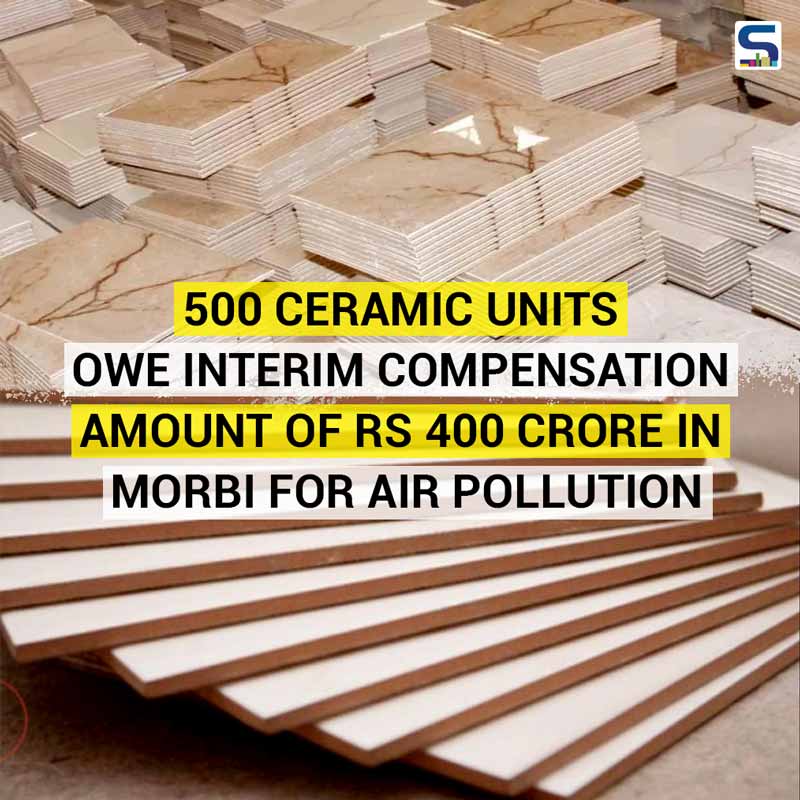
The Gujarat Pollution Control Board (GPCB) told Gujarat High Court that around 500 Morbi ceramic units are in debt of Rs 400 Cr, which they have to pay as compensation for the environmental damage caused by using coal-gasifier plants in their units. National Green Tribunal (NGT) directed the GPCB to close all the coal gasifier factories and units to deal with the air pollution in Morbi. Read SURFACES REPORTER (SR)’s complete report on this here:
Also Read: Asian Granito’s subsidiary finishes 12,000 sq m per day capacity expansion for GVT tiles
The representative and the senior counsel of GPCB, Ms. Manisha Shah apprised a division bench that ”in the entire Morbi district, all units using coal gasifiers have shut down… they have converted and shifted to gas-based operations.”
Shut Down of Coal Gasifiers
A principal bench of the National Green Tribunal (NGT) directed the GPCB to close all the coal gasifier factories and units to control or deal with pollution in Morbi. The district contains a variety of ceramic industries that are using coal gasifier plants. NGT wants the units to switch over to non-coal gasifiers or PNG or technology.
Further, the Tribunal had also directed GPCB that it must initiate “immediate steps for the prosecution of the industries which have operated in violation of law and recover compensation for causing damage to the environment and public health.”
Two-Fold Role of Committee
NGT also recommended constituting a committee with Central Pollution Control Board (CPCB), GPCB, and NEERI officials to assess the compensation amount recovered and create a restoration plan for the area. For the reparation, Shah submitted a report to incorporate some environmentalists or experts in this field to carry out an “extensive investigation and examination on how this area can be repaired as a long-term measure.”
The proposed interim ‘environmental damage compensation amount, which the GPCB directed the ceramic units to pay, was calculated as Rs 5,000 per day for operation of one coal gasifier initiating from the date of the consent of commission of the plant.
Also Read: India to get its first E- Highway soon| Delhi | Jaipur| SR News update
Gujarat High court received around 547 petitions in 2020 related to the interim compensatory amount. According to the ceramic units, they were not allowed to hear before deciding the amount, and the same thus goes against the principle of natural justice. The Gujarat HC in January 2020 had granted interim relief to the ceramic industries, pointing the GPCB not to take any coercive action against them concerning the GPCB’s order directing for payment of the temporary compensation amount.
Although the place is now gradually limping back to normalcy, the government needs funds to fix the damage caused. Justice Pardiwala has left it on the experts to look into the matter and find a solution for this. As per him, “nothing is wrong if such an interim compensation is determined, (but) no one would like to pay such a huge amount. Who would like to pay? So everyone has come running to the high court that ‘what is this, how could you have determined this?”
Keep reading SURFACES REPORTER for more such news stories.
Join us in SOCIAL MEDIA to stay updated
SR FACEBOOK | SR LINKEDIN | SR INSTAGRAM | SR YOUTUBE
You may also like to read about:
Plants of Tomorrow launched by Ambuja Cement & ACC | SR News Update
The demand for Oriented Strand Boards gains huge momentum in North America | What is OSB? | SR News update
and more...